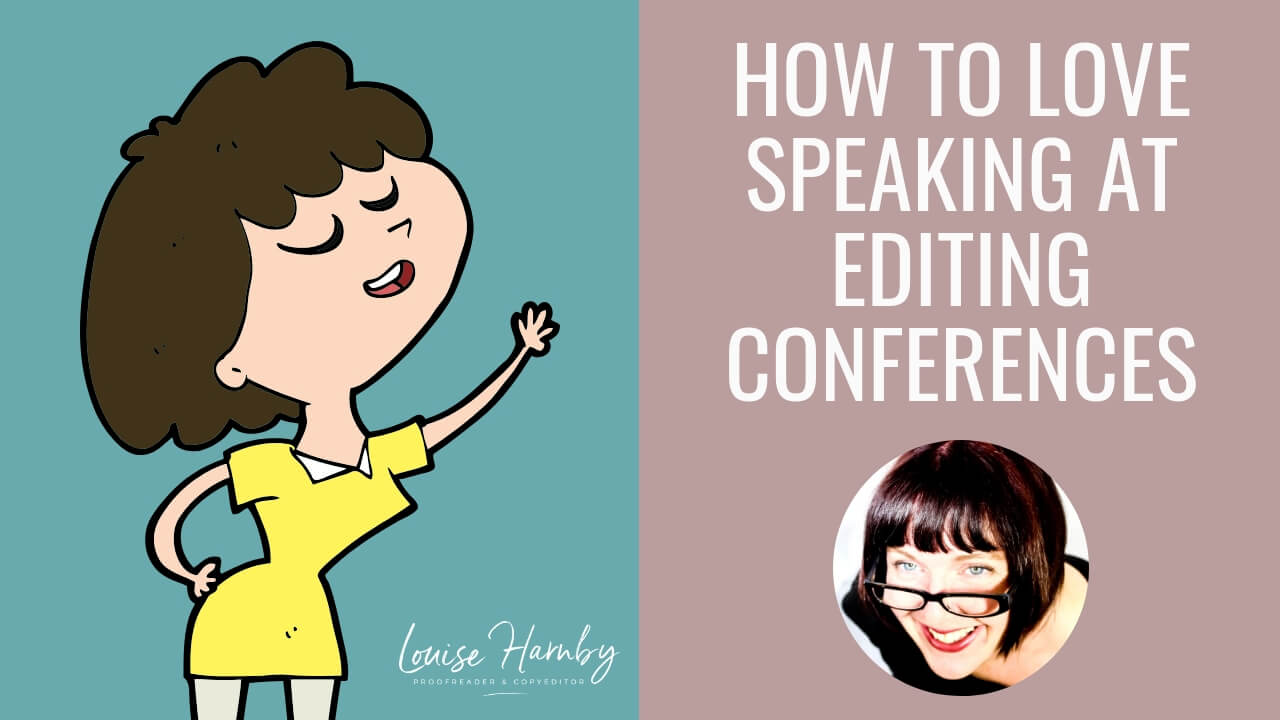|
Does standing up in front of a room full of editors terrify you? I know that feeling. Still, I learned how to love it, which rather took me by surprise. In this post I show you how I did it.
Let’s talk about nerves
I haven’t conquered my nerves about speaking at editing conferences, but that’s okay. Nerves are normal, even for presentations experts like my friend Simon Raybould. More on him later, but for now it’s enough to say that feeling nervous is not the same as suffering from a level of anxiety that renders you unable to step out of your comfort zone and try something that could push your editing business forward. Pushing your business forward Speaking at editing conferences will push your business forward. You’ll get yourself seen and heard. People will understand more about who you are, what you specialize in, and what you stand for (your brand). That will lead to opportunities: work referrals, awareness about courses or books that you offer, discounts on the conference registration price (even payment for some gigs), and invitations to speak at other conferences taking place in cities that require a little more effort to get to. Take me. I live in Norfolk (the UK one). On 7 November, I’ll be speaking at the Society for Editors and Proofreader’s mini-conference in Toronto (register here if you want to join me – it’s now open to non-SfEP members). It’s a massive honour to be invited. I get to talk about my two editorial passions – fiction and marketing! In 2016, I’d probably have shied away from doing this, despite the opportunity to hang out with my favourite Canadians (and a few of my favourite Americans). The words ‘I’m busy’ would have flown from my mouth just in time to curb the nausea. In 2017, I might have agreed to do it as long as I was sharing the spotlight with a pal, though the thought would still have made me queasy. But it’s 2018 and, to my surprise, I’m more than happy to fly solo.
One way to learn to love it
Loathing turned to love because I changed one thing: I dumped the script. This is where I get to talk about Simon again, because he’s the person responsible for making me love speaking at editing conferences. In May 2018, he wrote a blog post for me called 6 tips to help you speak in public with confidence. Tip 4 asks us not to use a script. I was gobsmacked. There was no way in hell I’d dare stand up in front of a group of my peers without having every word of my presentation memorized! We had a long chat about it over Skype, and by the end of that conversation he’d convinced me it was worth testing. And so when the SfEP’s conference director, Beth Hamer, asked me to do a two-hour session, on my own, at the annual conference in Lancaster, I promised her I would. And I promised myself I’d do it without a script. 3 snags with scripts Scripts are inherently problematic. Snag 1: They take time to learn, especially if you’re going to be talking for an hour. Unless you have a brilliant memory. Which I don’t. Snag 2: They’re hard to remember. If they were easy to remember, more of us would be on the stage. Which I’m not. Snag 3: They’re difficult to deliver well. If they were easy to deliver well, more of us would have Oscars and BAFTAs. Which I don’t. No wonder so many of us cringe at the thought of speaking at editing conferences. Even if we manage to learn the damn script, what are the chances that we’ll remember it, given how nervous we are? And if we’re uptight about remembering, what are the chances that we’re going to deliver our script in a way that’s engaging and informative? This is the kind of stuff that’s always been in my head when I think about presenting. All of which can be summed up as follows: at what point will I fail? Going scriptless You can’t fluff a script that doesn’t exist. That in itself gets rid of snags (1) and (2). All you can do is talk about the thing you’ve agreed to talk about. We’re not in the pub or having lunch with our mates, so we still need a structure. I am not a perfect presenter, not by any stretch. But I have embraced an approach that means I will present, and I will enjoy it. This is how I do it:
Because you’re talking rather than delivering a script, you’ll sound more natural. And because you can’t forget any of the key learning points, you’ll feel more relaxed. That’s snag (3) dealt with. There are caveats, of course. You must know your stuff. And you should rehearse. Each rehearsal will be different because you don’t have a script, but you will prove to yourself that you can talk through every one of the key learning points.
Being imperfect – audience expectations
Will you stumble if you’re scriptless? Maybe. Probably. I stumbled several times in Lancaster. But I loved every minute of that workshop. I felt relaxed, and as I talked I was in the moment, not tuned into the next thing I needed to remember. And the delegates gave me some amazing feedback. That they enjoyed it is the most important thing of all. I’m sold on scriptlessness! Plus, having a script doesn’t mean you won’t stumble. You’re human, after all. The difference is that when you’re scriptless, you get to stumble just because you stumbled, not because you forgot anything important or because you were distracted by the pressure of having to remember what’s up next. Here’s something Simon told me during our Skype chat: Your audience will forgive you if you trip up over a word. Your audience will forgive you if you stammer. Your audience will forgive you if you fluff a line and have to restart the sentence and explain something in a different way. Your audience will forgive you for just being an editor rather than a TED Talk speaker. What your audience will not forgive is your failing to deliver the key learning points that you promised you would ... for wasting their time. At the larger editing conferences, delegates have to choose which sessions to attend. So I know that when someone chooses to come to mine, they’re probably missing at least two workshops they’d have learned something valuable from. That I don’t teach them what I promised is unacceptable. And that is the only way I can fail. When will I see you again? If you can get to Toronto on 7 November 2018, please come and listen to me talking about how to build a knockout home page, getting fiction editing work, and marketing an editing business. Will I fluff my words? More than likely. Will I fail? No. I’ve already created slides for my key learning points and rehearsed what I’ll chat about. I might well stumble and stammer, but I will smile at you as I do so, and I will deliver what I've promised!
Louise Harnby is a line editor, copyeditor and proofreader who specializes in working with crime, mystery, suspense and thriller writers.
She is an Advanced Professional Member of the Chartered Institute of Editing and Proofreading (CIEP), a member of ACES, a Partner Member of The Alliance of Independent Authors (ALLi), and co-hosts The Editing Podcast. FIND OUT MORE > Get in touch: Louise Harnby | Fiction Editor & Proofreader > Connect: Twitter at @LouiseHarnby, Facebook and LinkedIn > Learn: Books and courses > Discover: Resources for authors and editors
10 Comments
16/10/2018 11:42:31 pm
Scriptless is indeed the way to go! Can't wait to see you in Toronto next month. It's going to be a blast.
Reply
Louise Harnby
17/10/2018 08:30:11 pm
Everything has arrived. I will be warm!
Reply
Louise Harnby
17/10/2018 12:38:13 am
Bought new winter coat and boots!
Reply
I was terrified to speak in public for a long time. (And it's still mortifying if I don't really know my stuff.) But I read a line in a self-help book years ago that made so much difference to me: "If you can interest the neighbour [talk with one person], you can interest all the neighbours [talk to a crowd]."
Reply
Louise Harnby
17/10/2018 11:24:23 am
Thanks, Phyl! You nailed it. Informal stumbling can still be engaging. Formal scripted stumbling is just uncomfortable to listen to. I love the neighbour idea!
Reply
I make an outline of points needed to cover, walk around and mumble to myself practicing my general opening for a few days, then walk into the room on the appointed day and wing it. Works fine. I'm always nervous, which makes me gesture too broadly, talk too loud, and pull faces, but that ends up breaking the ice and keeping the audience's attention. Soon we're all relaxed and a nice two-way flow gets going. It helps to invite questions as we go rather than waiting to the end. What helps the most is loving your topic and being well versed in it so you can just talk spontaneously.
Reply
Louise Harnby
17/10/2018 02:14:58 pm
Face-pulling! I think I do a lot of that too. It adds personality!
Reply
17/10/2018 01:17:50 pm
I spoke my way through most of the '90s, once having an out of body experience as I watched myself doing my schtick on autopilot. Speaking is very rewarding.
Reply
Louise Harnby
17/10/2018 02:14:00 pm
Thanks, Chris, for the extra great tips. I completely get that thing about knowing the room. I like to check all the tech's working ahead of time! Believe me, though, I do not plan on doing a lot of public speaking. I love words but I've love 'em most when they're on a page! Well, I am an editor!
Reply
11/12/2018 08:58:20 pm
I <i>love</i> the thought about not failing if you teach people what you planned to! That’s a very empowering perspective.
Reply
Leave a Reply. |
BLOG ALERTSIf you'd like me to email you when a new blog post is available, sign up for blog alerts!
TESTIMONIALSDare Rogers'Louise uses her expertise to hone a story until it's razor sharp, while still allowing the author’s voice to remain dominant.'Jeff Carson'I wholeheartedly recommend her services ... Just don’t hire her when I need her.'J B Turner'Sincere thanks for a beautiful and elegant piece of work. First class.'Ayshe Gemedzhy'What makes her stand out and shine is her ability to immerse herself in your story.'Salt Publishing'A million thanks – your mark-up is perfect, as always.'CATEGORIES
All
ARCHIVES
July 2024
|
|
|
|


















 RSS Feed
RSS Feed





